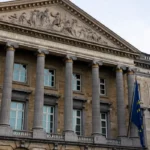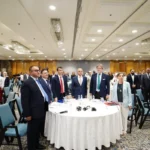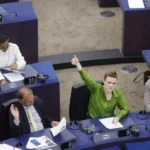The European Union remains divided. France abstained this Friday, October 13, during a vote of the Twenty-Seven. This focused on Brussels’ proposal to renew the authorization of glyphosate in the EU for ten years. In the process, the European Commission announced that the EU member states had not been able to reach an agreement.
A new vote will be taken in mid-November. The proposal, which the European executive can modify at any time, will be submitted to an appeal committee, which will decide on the fate of the controversial herbicide.
As a reminder, the current authorization of glyphosate in the EU, renewed in 2017 for five years then extended for an additional year, expires on December 15. However, the European Commission proposed to renew its green light until December 2033, after the report of a European regulator, considering that the level of risk did not justify banning the substance.
Gathered within the framework of a technical committee, representatives of the Member States voted this Friday behind closed doors to approve or not this proposal. France abstained, Minister of Agriculture Marc Fesneau confirmed to AFP.
“We have said, from the beginning, that the Commission’s proposal as it is formulated, 10 years without conditions, does not correspond to the trajectory” decided by France for several years, which is to “restrict uses, where there are alternatives to ensure that there is less glyphosate,” he explained.
There are still “technical impasses”, in fact, recalled the minister, estimating that there is, in particular, “the need to be able to use this molecule in a certain number of cases, such as in soil conservation agriculture [ which avoids plowing, editor’s note] or in mountainous areas. France is also asking for “possibly a shorter duration” than the ten years proposed by the commission as well as its approach being “harmonized at European level” to avoid any unfair competition.
And if Brussels amended its proposal, in particular by reducing “the maximum dose per hectare, that is not enough. The proposal is still less attractive compared to the measures put in place in France,” underlined, for his part, the Minister of Ecological Transition Christophe Béchu.
It has, in fact, been amended, but “only in an extremely cosmetic way, demonstrating a weak desire for movement despite the fact that neither France nor Germany supports the text”, also regretted Macronist MEP Pascal Canfin. The opinion of the European regulator EFSA leaves “enough gray areas to raise questions (…) we must therefore restrict uses wherever possible, and give ourselves the means”, he argued. , alongside the draft European legislation setting binding pesticide reduction targets, currently under negotiation.
The EU divided
Within the EU, the 27 are particularly divided. If many countries from the South and East support the re-authorization, Austria and Luxembourg had expressed their desire to vote against. And, as a result of the divisions in the coalition in power in Berlin, Germany announced “not to accept” the extension of the authorization. Finally, Belgium and the Netherlands indicated that they would abstain. In this context, the attitude of France, the EU’s leading agricultural power, is proving decisive.
If not, the European executive will then be able to decide alone to extend the authorization – only a qualified majority of states opposed to the text can block it.
However, according to Pascal Canfin, “France and Germany have had quite extensive discussions for several weeks” and could bring their respective positions closer together. The subject should therefore be on the agenda of a meeting of European environment ministers in Luxembourg on Monday.
For its part, the German group Bayer, which bought Monsanto in 2018 and manufactures Roundup, assured that it “remains confident that, in the next stage, enough other Member States will support the renewal of the approval of glyphosate”, saying “convinced of its safety”.
A controversial herbicide
Glyphosate, the active substance in several herbicides – including Monsanto’s Roundup, widely used around the world – was classified in 2015 as a “probable carcinogen” by the International Agency for Research on Cancer of the World Health Organization. According to the agency, “case-control studies of occupational exposure conducted in Sweden, the United States and Canada have shown increased risks of non-Hodgkin lymphoma” (a blood cancer). The WHO said it had “limited evidence”, but experts considered it sufficient to warn of a carcinogenic effect in humans. According to the IARC, “compelling evidence” shows that glyphosate can also cause cancer in laboratory animals.
These conclusions were confirmed in 2021 by a study by the National Institute of Health and Medical Research (Inserm). The French institute concluded that “there is an increased risk of non-Hodgkin lymphoma” with “a medium level of presumption”.
Conversely, in July, the European Food Safety Authority (EFSA) indicated that it had not identified any “critical areas of concern” in humans, animals and the environment that could prevent the authorization of the herbicide. It only noted a risk in mammals for half of the proposed uses, and recognized that a lack of data prevented any definitive analysis.
Restricted use?
To take this into account, Brussels is proposing some safeguards, in particular with the “default” establishment of “buffer strips” and equipment reducing “spray drift”, while the use for desiccation (spreading to dry cultivation before harvest) would be prohibited. If the active substance is approved at EU level, each State remains responsible for authorizing products containing glyphosate, setting the rules of use according to crops, climatic conditions and geographical specificities.
Within the strict framework of the criteria set by the EU, States could thus restrict use according to the potential effects on the environment and biodiversity, the evaluation of other components of herbicides, and the exposure of consumers to “residues”. ”, while ensuring the protection of groundwater. Possible limitations considered very insufficient by some of the Twenty-Seven when NGOs and elected environmentalists continue to demand an outright non-renewal of the herbicide.
In France, unions divided on the issue of glyphosate
This is also the case of the Peasant Confederation which called on France to vote against, considering that the European proposal to authorize glyphosate for ten additional years “is purely scandalous”. “France still has this position of not banning as long as there is no alternative, but if we do not set a close horizon for the ban, the serious search for alternatives does not take place,” Laurence Marandola, a farmer in Ariège and spokesperson for the union, explains to La Tribune, pleading for “the implementation of suitable tools for mechanical weeding”, for example, and above all “technical support” for farmers.
“But we will not find version B of glyphosate, as effective and as inexpensive,” she warns.
For its part, the National Federation of Agricultural Operators’ Unions (FNSEA) is opposed to a total ban on the herbicide. In an open letter to Emmanuel Macron on Wednesday, the president of the union, Arnaud Rousseau, called on the head of state to provide “a positive response for the re-approval of glyphosate at the European level” seeing this as “the condition to allow us to “climbing Everest represented by the double challenge of food sovereignty and the fight against climate change”. It therefore appears that neither organization has been heard.
This article is originally published on latribune.fr







